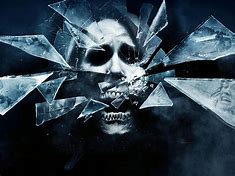Broken. The dictionary defines it as 1. reduced to fragments; fragmented. 2. ruptured; torn; fractured. 3. not functioning properly; out of working order. Have you ever seen a sign that says “Temporarily Out of Order”? It gives you the hope the object will be working again at some point. If something is fragmented, sometimes the fragments can be put back together and it’s fixed. Sometimes not.
Cracked. The dictionary defines it as 1. broken without separation of parts; fissured 2. damaged; injured. Not as severe as broken. The parts aren’t separated, and it can be fixed easier. Damaged in some way, but not fragmented. If we apply this idea to a bone in your body, both can be fixed, but a broken bone sometimes requires additional material to help it fuse, something to isolate it while it heals and/or a longer time before it’s back to normal functioning. A cracked bone usually heals quicker, and may require a splint or cast for a short time to protect it as it heals.
There have been things in our lives that cause cracks. We are injured, but not fragmented. We can mostly function, but there’s a crack somewhere that keeps us from fully functioning in some way. We need time to heal, and we figure out how to protect that part of ourselves until it does heal. Sometimes we are worried that the same injury will occur, so even after it’s healed, we continue to protect or isolate that part of us. That’s when it becomes unhealthy. Can you imagine wearing a finger splint or a cast for the rest of your life? When used properly it aides in healing, when overused, it actually reduces function and could cause permanent dysfunction to the formerly injured part.
For some of us, there have been things in our lives that broke us. Reduced us to fragments, tore us apart, rendered us out of working order. We cannot functio

n. We need lots of time to heal, we need to protect ourselves to heal, and we may need additional help to fuse our fragments back together. After a break, we have the instinct to over protect that part of us. We remember the pain, the confusion, the sadness, all the feels we experienced, and never want to feel that again. Again, the very things that helped us heal, if relied on for protection too long, can cause reduced function and eventually permanent dysfunction.
Let me tell you a story. When I was four years old, I was riding a motorcycle on Thanksgiving, with my brother driving, me sitting behind him, and my cousin riding on the seat behind me. We were in a field across from my house. The motorcycle fell over on it’s side. It fell on my tiny leg and broke my femur. My brother carried me home. My parents took off my little snowsuit and my leg was SWOLLEN. The doctor came to the house, and sent us off to the hospital an hour away. The bone was broken so high it couldn’t be in a cast. I was put in traction for nearly a month. My ankle was in a sling that was hoisted up, and attached to a bar above my bed, 24 hours a day. Not easy for a four year old. Then came a wheelchair at the hospital and physical therapy. I had to re-learn how to walk. My foot turned in for awhile, and my leg was weak, but eventually I went home on crutches. In time, my bone healed and I ran and played like any other little kid. It never bothered me again.

When we have been emotionally broken or cracked, we are very aware of the injured part of us, it’s “swollen”. Sometimes we let others know that we are out of working order by pushing them away with anger, sarcasm, withdrawing, or other overt means. Sometimes we isolate ourselves, turning inward and protecting ourselves. Maybe we have “crutches” and figure out how to outwardly function, but inside we are scared or in pain and no one knows.
It’s so hard to gather all the fragments of you and put them back together by yourself. It’s so hard to know when you can stop using your splint, your cast, your crutches, because you are the one in pain. Sometimes, we have used the thing that was to protect us so long, it’s become a part of us, and we don’t even realize we are using it when we don’t need it.
I want to encourage you to ask for help. Often, a crack properly treated, can prevent a break. If you are feeling cracked, could you ask someone to help you so you don’t break? If you are broken, could you ask someone to help support you while you heal? It doesn’t

mean you are weak or lacking or less than. It takes courage to ask for help. It’s takes strength. I want you to feel whole again. I want you to be rid of all your protective devices so you can live your life in freedom. I know it’s hard. I have an appointment this week with a new therapist. I’ve been feeling a little cracked lately. I don’t want to break. But, just making the appointment was hard. I kept putting it off. My anxiety about going is high, and I’m a therapist! If I can do it, you can do it.
Be kind, be grateful, be courageous!
Jules
